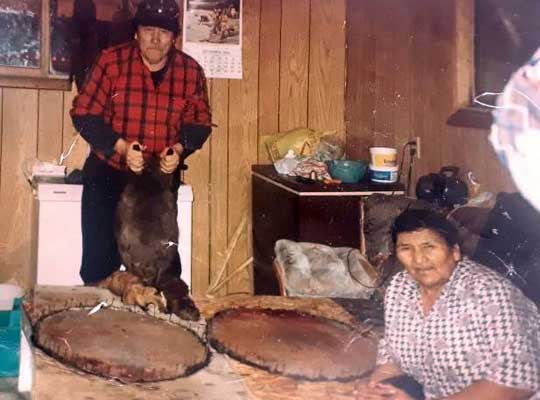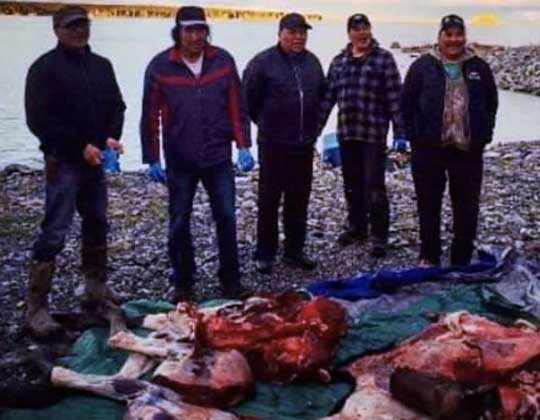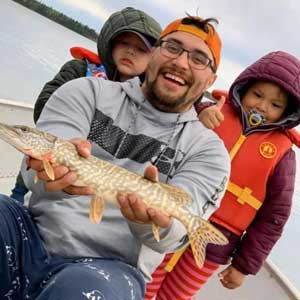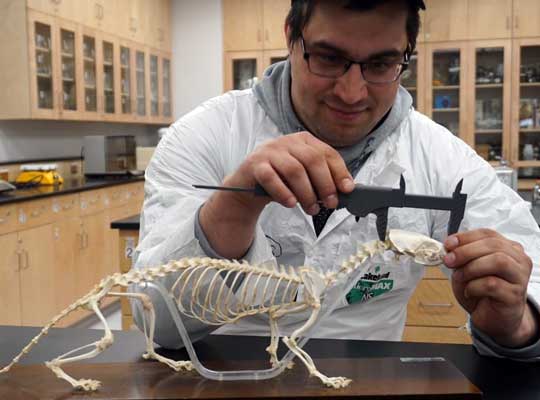Photo: Ramsey Cook’s Grandparents, Eve and Joseph Keeper.
The following article was submitted by Ramsey Cook, a Wildlife Management Graduate from the Natural Resources Management Technology (NRMT) Program at the University College of the North (UCN), The Pas Campus.
Tansi! My name is Ramsey Cook and I am from Split Lake. I belong to Tataskwayak Cree Nation. It was here my grandparents Eve and Joseph Keeper and my Uncles raised me to appreciate ‘wildlife’ … and understand the importance of practical learning while living in nature. Daily chores included hauling water, cutting wood, checking nets and feeding the dogs. As a child, it was fun and I fought to stay ‘out’ of school, but Grandma would usually have me dressed before I was even awake! On occasion, though, I stayed home and on one of these rare days, I remember a conversation with my Grandpa Joseph as though it were yesterday! He sat me down and stated
“Ka-kis-ki-naw-mah-ko-Yan-pi-ko, Kah-to-tah-wah-chik-kis-ki-naw-mah-kewy, chi-ka-as-ke-Kah-pe-to-se-tah-kawn, chi-ka-mah-kis-ki-naw-mah-ka-win-ka-kis-ka-ta-mahn”,
… in English he said,
“Ramsey, you have to go to school. You have to listen to your teachers. The world will be different. You are going to need an education”.
This memory lingers in my heart like a strange and unsettled spirit. I often wonder why my grandparents so desperately wanted me to acquire an education while ‘schooling’ was the very thing that caused them so much pain in ‘their’ lives. For instance, my grandfather spoke repeatedly about running into the forest to hide from a plane that landed on the frozen lake where he and his sister played. Sadly, and without consent, he would never see her again. She was taken to a residential school somewhere …
My grandparents are in the Spirit World now … but even today their words and stories lead to conflicting shifts in my perspectives about learning and education here in the north. Particularly so, following my Wildlife Instructor asking me to think and write about important ideas I might want to share regarding ‘wildlife’ following graduation. Essentially, he encouraged me to use ‘both my ‘education’s’ to translate my real life struggles and to share my ‘blended learnings’ to counteract the tendency to do wildlife wrong. I want to produce this same confidence in my children. I want to generate the same pride in their educations as my Grandparents had in preparing beaver pelts.

Photo: My Grandparents ... Eve and Joseph Keeper, stretching beaver pelts.
I want my children’s desire to learn to be as explosive as mine. Like my Grandpa and my Uncles, I want to share my knowledge about wildlife and learning using ‘allegories’ to reveal hidden morals and meanings from … more approachable manners! I want to teach my children that the term ‘allegory’ comes from a Latin word ‘allegoria’, meaning writing to imply something else.
Simply, an allegory is a story (like mine) that represents a larger point about human nature, actions of truth, and symbolic figures that echo stories from our past. One of the best-known allegories is Plato’s ‘Allegory of the Cave’. Google it! In his story, Plato imagines people living in a cave, only ever seeing objects as shadows reflected on the wall from the light of a fire (rather than seeing the objects directly). Plato used the cave as a symbolic representation of how we live in the world. How different people from different cultures contrast ‘their’ realities versus other’s interpretation of it! This is the holistic perspective examination I want to teach to my children while they develop their own learning styles in today’s world.

Photo: Ramsey’s Uncles prepping a moose they harvested.
The purpose of an ‘allegory’ is to express ideas and comment on controversial ideas like ‘educational collisions’ our family has experienced … and now, following lectures about ‘wildlife management’ in these new times, that otherwise might be too dangerous to talk about. For instance, Manitoba’s dwindling moose populations and sustainable harvests, no matter who you are!

Photo: Me with my son Henry and my daughter Carlaya.
Think about it. Each and every day, we are confronted by different perspectives ‘and shadows’, each of which is plausible from a particular frame of reference. For example, the conservation of forests, establishing protected areas, saving endangered and threatened species like Manitoba’s Moose and acquiring an education. Even global climate change requires mixtures of consideration. Each of our wildlife challenges in this world must involve understanding. Perhaps most important, each of our issues cannot be separated from values and equity.
Being a student of UCN has taught me that even though I like learning new words … sometimes there really is no vocabulary. It is tough for all of us to speak with each other. Hence, each of us needs to open our approaches to new learnings and complicated environmental problems. There are no experts, nor can there be. Instead, we must maintain a dialogue with those interested and listen to our Grandparents and Uncles more closely. A satisfactory resolution to Wildlife Management may well hinge on stories that only become available if those interested listen carefully. I want my children to. Perhaps if room is made for ‘allegory’s’ like mine, a new science that incorporates values will emerge and we will all be able to learn more easily from each other.

Photo: Ramsey determining some species-specific measurements with a caliper in Wildlife Management Lab.
So, although it has taken me a few years … learning about wildlife species and historical figures in Wildlife Management lectures like Aldo Leopold and Ralph Waldo Emerson, my education at the University College of the North (UCN) has helped me to emphasize what good learning is. In the words of William Wordsworth our “relationship with nature helps us to connect to both the spiritual and the social worlds” … and it is this phrase that really hit home with me!
I too, like my Grandparents, Uncles and William Wordsworth, hope to pass on these important learnings to ‘my’ children because I now believe “a love of nature can lead to a love of humankind” (William Wordsworth). I will graduate within a month or so …
… if only my Grandparents could see me now! My Uncles are.
Kwani-mah, ekosi.